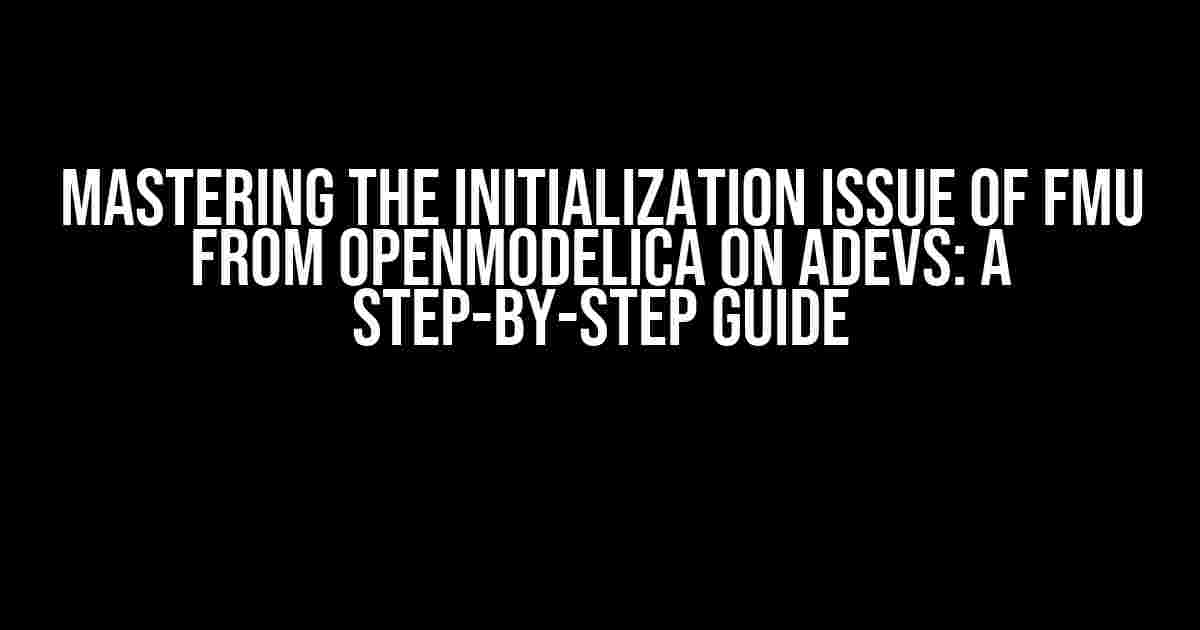Introduction
Model-Exchange (MX) and Co-Simulation (CS) are two popular features of the Functional Mock-up Interface (FMI), allowing users to seamlessly integrate and simulate complex systems. However, when using OpenModelica to generate an FMU (Functional Mock-up Unit) and attempting to initialize it on ADEVS (A Discrete EVent System simulator), users often encounter the frustrating initialization issue. Fear not, dear reader, for this article will walk you through the troubleshooting process, providing clear and concise instructions to overcome this hurdle.
Understanding the Initialization Issue
The initialization issue arises when the FMU, generated by OpenModelica, fails to initialize properly on ADEVS. This can manifest in various ways, such as:
- Errors during the initialization process
- FMU crashing or freezing during simulation
- Incorrect or inconsistent simulation results
- Warnings and error messages related to initialization
Before diving into the troubleshooting process, let’s briefly explain the underlying causes of this issue:
- Incompatible model structure: OpenModelica generated FMUs may have a different structure than what ADEVS expects, leading to initialization issues.
- Incorrect or missing metadata: Essential metadata, such as model attributes or dependencies, might be missing or incorrectly defined, causing initialization failures.
- Datatype mismatches: Datatype mismatches between the FMU and ADEVS can prevent proper initialization.
Troubleshooting the Initialization Issue
Now that you’re familiar with the possible causes, let’s dive into the step-by-step troubleshooting process:
Step 1: Verify the FMU Generation Process
First, ensure that the FMU generation process is correct:
openmodelica -g FMU MyModel.mo
Verify that the generated FMU file is correct and contains the necessary metadata.
Step 2: Check the Model Structure
Open the FMU file in a text editor or use a tool like Dymola to inspect the model structure:
<ModelStructure>
<Components>
<Component>
<Name>MyComponent</Name>
<Type>MyType</Type>
</Component>
</Components>
</ModelStructure>
Ensure that the model structure is compatible with ADEVS. If necessary, modify the model structure to conform to ADEVS’s requirements.
Step 3: Verify Metadata and Dependencies
Check the metadata and dependencies in the FMU file:
<ModelVariables>
<ScalarVariable>
<Name>x</Name>
<Description>State variable x</Description>
<Type>Real</Type>
</ScalarVariable>
</ModelVariables>
<ModelDependencies>
<Dependency>
<Name>MyDependency</Name>
<Type>DependencyType</Type>
</Dependency>
</ModelDependencies>
Verify that all necessary metadata and dependencies are present and correctly defined.
Step 4: Resolve Datatype Mismatches
Check for datatype mismatches between the FMU and ADEVS:
| FMU Datatype | ADEVS Datatype | Resolution |
|---|---|---|
| Real | double | Use double instead of Real in the FMU |
| Integer | Use int instead of Integer in the FMU |
Modify the FMU to use compatible datatypes with ADEVS.
Step 5: Test and Validate the FMU
Once you’ve addressed the potential issues, re-generate the FMU and test it on ADEVS:
openmodelica -g FMU MyModel.mo adevs -i MyFMU.fmu
Verify that the FMU initializes correctly and produces expected results.
Best Practices for Avoiding Initialization Issues
To avoid initialization issues in the future, follow these best practices:
- Use compatible model structures and metadata formats.
- Verify FMU generation and contents.
- Test and validate FMUs before deployment.
- Document model assumptions and limitations.
- Regularly update OpenModelica and ADEVS to ensure compatibility.
Conclusion
In this comprehensive guide, we’ve covered the common initialization issue of FMU from OpenModelica on ADEVS and provided a step-by-step troubleshooting process to overcome it. By following these instructions and best practices, you’ll be well-equipped to diagnose and resolve initialization issues, ensuring seamless integration and simulation of complex systems. Remember to stay vigilant and adapt to changes in OpenModelica, ADEVS, and the FMI standard to avoid future initialization issues.
Happy modeling and simulating!
Frequently Asked Questions
Get the answers to the most common initialization issue of FMU from OpenModelica on ADEVS
Q1: What is the most common cause of initialization issues with FMU generated from OpenModelica on ADEVS?
The most common cause of initialization issues is the incorrect specification of the initial values of the variables. Make sure to specify the initial values correctly in the model, and also check the consistency of the initial values with the model equations.
Q2: How can I debug the initialization issue of FMU on ADEVS?
To debug the initialization issue, you can use the OpenModelica debugger to step through the initialization process and check the values of the variables at each step. You can also use the ADEVS logging mechanism to log the values of the variables during initialization and identify the point of failure.
Q3: What is the impact of initialization issues on the simulation results?
Initialization issues can lead to incorrect simulation results, as the model may not start from a valid initial state. This can cause the simulation to diverge or produce nonsensical results. In some cases, the simulation may even crash or terminate prematurely.
Q4: Can I use the same initialization values for different FMUs?
No, you should not use the same initialization values for different FMUs, as each FMU has its own specific requirements and constraints. Using the same initialization values may lead to initialization issues or even simulation failure.
Q5: Are there any best practices to avoid initialization issues with FMU on ADEVS?
Yes, some best practices to avoid initialization issues include specifying initial values consistently, using meaningful variable names, and testing the model thoroughly before generating the FMU. Additionally, ensure that the model is correctly formulated and the equations are consistent with the initial values.
